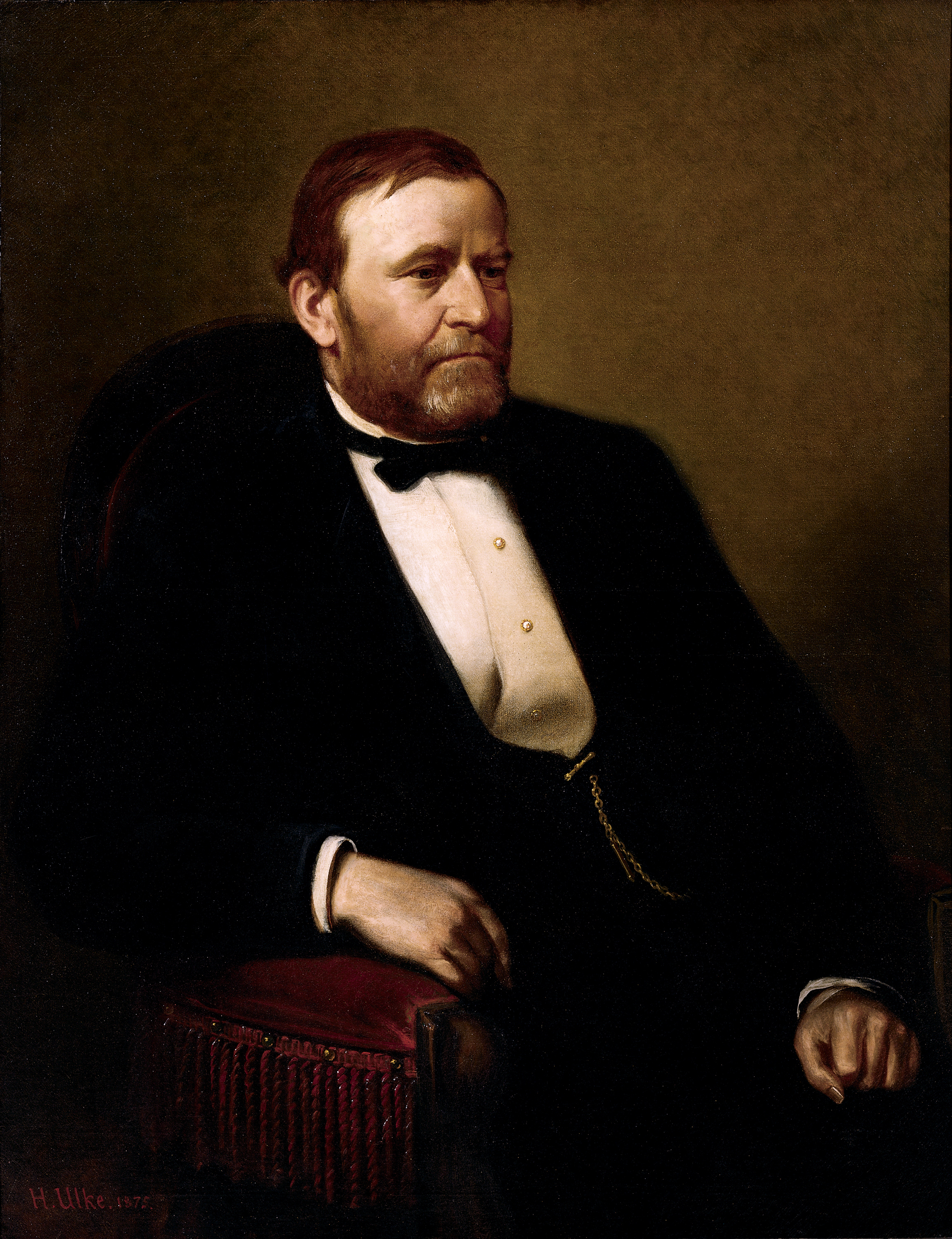Although a soldier by profession, I have never felt any sort of fondness for war, and I have never advocated it, except as a means of peace.
Fonte: Discurso em Londres, como citado no Memorial da Vida Gen. Ulysses S. Grant (1889), editado por Stephen Merrill Allen, p. 95
Ulysses S. Grant frases e citações
Ulysses S. Grant: Frases em inglês
1870s, Eighth State of the Union Address (1876)
1870s, Second State of the Union Address (1870)
To Alexander H. Stephens, Lincoln http://www.imsdb.com/scripts/Lincoln.html (2012).
In fiction, Lincoln (2012)
Letter to C. P. Wolcott, Assistant Secretary of War, Washington (17 December 1862).
1860s
1860s, First State of the Union Address (1869)
“Labor disgraces no man; unfortunately you occasionally find men disgrace labor.”
Speech at Midland International Arbitration Union, Birmingham, United Kingdom (1877).
1870s
As quoted in letter to Henry Ward Beecher, by Mark Twain.
1870s, Message to the Senate and House of Representatives (1870)
After hearing of John Sedgwick's death, as quoted in The Battles for Spotsylvania Court House and the Road to Yellow Tavern May 7–12, 1864 https://en.wikiquote.org/wiki/Special:BookSources/0807121363 (1997), by Gordon C. Rhea, Baton Rouge: Louisiana State University Press, p. 95.
1860s
1870s, Third State of the Union Address (1871)
Letter to his sister Mary (15 December 1862) https://books.google.com/books?id=mUjQAAAAMAAJ&pg=PA505
1860s
Fonte: 1870s, Around the World with General Grant (1879), pp. 162–163
To Otto von Bismarck in June 1878, as quoted in Around the World with General Grant http://www.granthomepage.com/grantslavery.htm (1879), by John Russell Young, The American News Company, New York, vol. 7, p. 416
1870s, Around the World with General Grant (1879)
On the Mexican–American War, p. 448 https://archive.org/details/aroundworldgrant02younuoft/page/n4
1870s, Around the World with General Grant (1879)
On Mexicans and Mexico's future, pp. 448–449 https://archive.org/details/aroundworldgrant02younuoft/page/n4
1870s, Around the World with General Grant (1879)
As quoted in Words of Our Hero, Ulysses S. Grant https://books.google.com/books?id=wqJBAAAAYAAJ&pg=PA48&lpg=PA48&dq=%22the+one+thing+i+never+wanted+to+see+again+was+a+military+parade%22&source=bl&ots=zH525oYpJn&sig=ACfU3U0GLPNgij-FmXIDwgWp_Kg8zDskWg&hl=en&sa=X&ved=2ahUKEwj4uc7PzKniAhUq1lkKHWhlBfQQ6AEwBXoECAUQAQ#v=onepage&q=%22the%20one%20thing%20i%20never%20wanted%20to%20see%20again%20was%20a%20military%20parade%22&f=false, by Jeremiah Chaplin, p. 57
1880s, Speech at Warren, Ohio (1880)
As quoted in Words of Our Hero, Ulysses S. Grant https://books.google.com/books?id=wqJBAAAAYAAJ&pg=PA48&lpg=PA48&dq=%22the+one+thing+i+never+wanted+to+see+again+was+a+military+parade%22&source=bl&ots=zH525oYpJn&sig=ACfU3U0GLPNgij-FmXIDwgWp_Kg8zDskWg&hl=en&sa=X&ved=2ahUKEwj4uc7PzKniAhUq1lkKHWhlBfQQ6AEwBXoECAUQAQ#v=onepage&q=%22the%20one%20thing%20i%20never%20wanted%20to%20see%20again%20was%20a%20military%20parade%22&f=false, by Jeremiah Chaplin, p. 58
1880s, Speech at Warren, Ohio (1880)
Ulysses S. Grant, as quoted in Words of Our Hero, Ulysses S. Grant https://books.google.com/books?id=wqJBAAAAYAAJ&pg=PA48&lpg=PA48&dq=%22the+one+thing+i+never+wanted+to+see+again+was+a+military+parade%22&source=bl&ots=zH525oYpJn&sig=ACfU3U0GLPNgij-FmXIDwgWp_Kg8zDskWg&hl=en&sa=X&ved=2ahUKEwj4uc7PzKniAhUq1lkKHWhlBfQQ6AEwBXoECAUQAQ#v=onepage&q=%22the%20one%20thing%20i%20never%20wanted%20to%20see%20again%20was%20a%20military%20parade%22&f=false, by Jeremiah Chaplin, p. 59
1880s, Speech at Warren, Ohio (1880)
Upon stopping his men from cheering after Lee's surrender at Appomattox Court House (9 April 1865)
1860s
U.S. Grant's "perfect speech" which he used on several occasions beginning in 1865, as quoted in Grant: A Biography (1982) by William S. McFeely, p. 234
1860s
The expression of these kindly feelings were not restricted to a section of the country, nor to a division of the people. They came from individual citizens of all nationalities; from all denominations — the Protestant, the Catholic, and the Jew; and from the various societies of the land — scientific, educational, religious or otherwise. Politics did not enter into the matter at all.
I am not egotist enough to suppose all this significance should be given because I was the object of it. But the war between the States was a very bloody and a very costly war. One side or the other had to yield principles they deemed dearer than life before it could be brought to an end. I commanded the whole of the mighty host engaged on the victorious side. I was, no matter whether deservedly so or not, a representative of that side of the controversy. It is a significant and gratifying fact that Confederates should have joined heartily in this spontaneous move. I hope the good feeling inaugurated may continue to the end.
Conclusion
1880s, Personal Memoirs of General U. S. Grant (1885)
The system of labor would have soon exhausted the soil and left the people poor. The non-slaveholders would have left the country, and the small slaveholder must have sold out to his more fortunate neighbor. Soon the slaves would have outnumbered the masters, and, not being in sympathy with them, would have risen in their might and exterminated them. The war was expensive to the South as well as to the North, both in blood and treasure, but it was worth all it cost.
Ch. 41
1880s, Personal Memoirs of General U. S. Grant (1885)
Fonte: 1880s, Personal Memoirs of General U. S. Grant (1885), Ch. 16
1870s, Eighth State of the Union Address (1876)
As quoted in "Campaigning with Grant" http://books.google.com/books?id=Y7TPAAAAMAAJ&q="Oh+I+am+heartily+tired+of+hearing+about+what+Lee+is+going+to+do+Some+of+you+always+seem+to+think+he+is+suddenly+going+to+turn+a+double+somersault+and+land+in+our+rear+and+on+both+of+our+flanks+at+the+same+time+Go+back+to+your+command+and+try+to+think+what+we+are+going+to+do+ourselves+instead+of+what+Lee+is+going+to+do"&pg=PA230#v=onepage (December 1896), by General Horace Porter, The Century Magazine
1860s
As quoted in "International Arbitration" by W. H. Dellenback in The Commencement Annual, University of Michigan (30 June 1892) and in A Half Century of International Problems: A Lawyer's Views (1954) by Frederic René Coudert, p. 180
